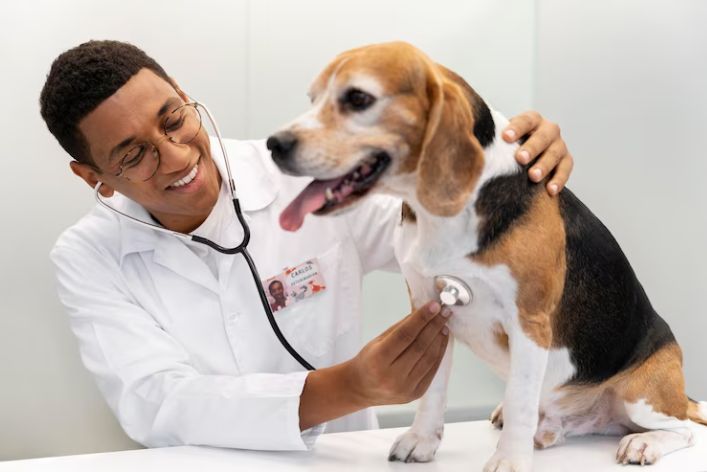Introduction
The purpose of this blog post is to shed light on veterinary services in Nigeria. Veterinary services encompass healthcare services for animals that include prevention, diagnosis, and treatment of animal diseases.
In Nigeria, the services rendered by veterinary professionals are indispensable to the agricultural sector and public health.
This blog post will provide an overview of veterinary services in Nigeria, including the history of veterinary medicine in the country, the role of veterinary professionals in animal health management, and the challenges encountered in the delivery of veterinary services.
Additionally, it will highlight the importance of veterinary services in safeguarding public health, ensuring food security, and promoting sustainable agriculture in Nigeria.
The blog post will also discuss the educational requirements for pursuing a career in veterinary medicine in Nigeria, the prospects for career growth in the field, and the opportunities available to veterinary professionals in the private and public sectors.
Overall, this blog post seeks to enlighten readers about the significance of veterinary services in Nigeria and raise awareness about the contributions of veterinary professionals to animal and public health.
The information contained in this blog post will be helpful to individuals interested in pursuing a career in veterinary medicine or seeking to learn more about the field.
Read: An Overview: Agri-Marketing Jobs in Nigeria
Education and Licensing Requirements
If you have an innate love for animals and a passion for their well-being, a career in veterinary services may be the perfect fit for you.
This article will discuss the education requirements for individuals interested in pursuing a career in Veterinary Services in Nigeria as well as the importance of obtaining a license.
Education Requirements
Individuals interested in pursuing a career in Veterinary services in Nigeria are required to possess a Bachelor’s degree in veterinary medicine. The degree program typically takes five years, and students are introduced to the necessary skills and knowledge needed to become a proficient veterinarian.
The course curriculum includes animal anatomy, pharmacology, animal behavior, surgery, and epidemiology. During the program, students are also required to participate in on-the-job training, through practicals in the clinic or laboratory, and of course, exposure to real-world experiences through internships.
However, veterinary medicine is a demanding field, and it requires candidates to have good grades in the science subjects, particularly in biology, chemistry, and physics.
Therefore, having passed the relevant subjects at the secondary school level with good grades will determine the student’s eligibility to pursue veterinary medicine at the university.
Licensing Requirements
Veterinarians in Nigeria are required by law to possess a license to practice veterinary medicine. A veterinary license is a legal document that allows an individual to practice veterinary medicine within the country.
The Nigerian Veterinary Medical Association (NVMA) is the regulatory body responsible for granting veterinary licenses in Nigeria.
Before obtaining a license, an individual must have completed an undergraduate degree in veterinary medicine from an accredited university and participated in a mandatory one-year internship program at a recognized veterinary clinic.
To get a license, interested individuals must register with the NVMA and then sit for the Veterinary Council of Nigeria (VCN) licensure examination. The examination typically includes a written test and an oral exam, and upon passing, the individual is granted a license to practice veterinary medicine in Nigeria.
The Importance of Obtaining a License
Obtaining a veterinary medicine license in Nigeria is crucial to establish credibility and professionalism. Without a license, individuals are not recognized as professionals, and their services are not legally acknowledged.
Lack of a license also means no accountability for malpractice, damaging trust and potential legal consequences.
Pursuing a career in veterinary services in Nigeria is ideal for those passionate about animal welfare. A bachelor’s degree from an accredited university and a veterinary license are mandatory to practice. A license signifies professionalism, legalizes practice, and ensures accountability.
Read: Insight into Nigeria’s Agricultural Education Careers
Job Duties
Veterinary services in Nigeria are an important aspect of the healthcare system. Veterinarians play a crucial role in the well-being of animals and ensure that they receive the necessary care and treatment.
Let’s delve into the job duties of a veterinarian in Nigeria and provide a detailed description of their daily responsibilities.
Diagnosing and Treating Animals
One of the primary responsibilities of a veterinarian is to diagnose and treat animals that come into their clinic.
They are responsible for conducting thorough physical examinations, taking medical histories, ordering diagnostic tests, and making a diagnosis.
Once they have made a diagnosis, they develop a treatment plan that may include medication, surgery, or other interventions.
Providing Preventative Care
In addition to treating sick or injured animals, veterinarians in Nigeria are also responsible for providing preventative care. This involves administering vaccinations, performing routine check-ups, and recommending diet and exercise plans to ensure that animals maintain optimal health.
Performing Surgeries
Veterinarians in Nigeria may also perform surgeries to treat a variety of conditions. These surgeries can range from routine procedures, such as spaying and neutering, to more complex surgeries to treat injuries or illnesses.
Assisting with Animal Births
Veterinarians are also responsible for assisting with animal births. This involves monitoring the animal’s progress during pregnancy, providing prenatal care, and assisting with the delivery of the offspring.
In addition to these specific job duties, veterinarians in Nigeria must also maintain accurate medical records for each animal they treat, communicate effectively with animal owners, and stay up-to-date with the latest advancements in veterinary medicine.
Furthermore, they must be emotionally resilient as the job can be emotionally challenging at times.
The emotional aspects of the job
As veterinarians often form strong bonds with their patients and their owners, they can experience a range of emotions while performing their job duties.
Euthanasia can be an emotionally challenging task for veterinarians, as they have to balance their desire to end an animal’s suffering with their compassion for the animal and its owner. Often, they have to counsel grieving owners and provide support during difficult times.
Therefore, veterinary services in Nigeria are an essential component of the healthcare system, and veterinarians play a vital role in ensuring the well-being of animals.
Their job duties are wide-ranging and varied, and they must maintain a high level of emotional resilience to cope with the emotional aspects of the job. Ultimately, their dedication and passion for their work make them an indispensable part of the healthcare system in Nigeria.
Read: Nigeria’s Dairy Industry: Exciting Career Prospects
Challenges and Advantages
In Nigeria, the veterinary profession is facing several challenges despite being an essential part of the nation’s economy. These challenges can discourage young individuals from pursuing a career in the veterinary services.
However, with the right mindset and dedication, this profession can be satisfying, and there are several advantages to it.
Challenges Faced by Veterinarians in Nigeria
- Absence of proper facilities and equipment in veterinary clinics and hospitals.
- Inadequate funding and support from the government, resulting in low salaries and benefits.
- Insufficient availability of feed and drugs for livestock health care, leading to poor animal health and high mortality rates.
- Lack of awareness by farmers and livestock owners regarding the need for proper animal health care.
- Inadequate manpower hindering efficient veterinarian services delivery to rural communities.
How These Challenges Can be Overcome
The Nigerian government should fund veterinary services, enhance clinic infrastructure, and support veterinarian training.
Educate livestock owners and farmers on proper animal care to reduce mortality and boost production.
Provide incentives like tax breaks and grants to encourage private veterinary clinics and animal healthcare businesses in rural areas, thereby increasing veterinary manpower.
Advantages of Choosing Veterinary Services as a Career in Nigeria
- Veterinary services provide an opportunity to contribute to the nation’s economy as a veterinarian can be involved in various aspects of animal and livestock production, food industries, and the agricultural sector.
- The huge demand for veterinary services in Nigeria makes it a lucrative career choice as livestock rearing is a significant part of the nation’s economy. There are vast opportunities to earn a considerable income as a veterinarian.
- Veterinarians play a crucial role in public health as they are involved in the prevention and control of zoonotic diseases that can spread from animals to humans. This role makes veterinarians essential in safeguarding public health and ensuring food safety.
- Veterinary services offer a unique opportunity for individuals who are passionate about animals to fulfill their career aspirations. It provides immense satisfaction to individuals who love animals and want to make a difference in their lives.
- Veterinary services offer opportunities for professional development and specialization in areas such as animal genetics, surgery, radiology, public health, and pathology.
In essence, although the veterinary profession in Nigeria presents several challenges, a career in veterinary services can be fulfilling and provide many advantages.
Overcoming the challenges faced by veterinarians in Nigeria requires a collective effort from the government, livestock owners, and the veterinary community.
Choosing a career in veterinary services in Nigeria can guarantee job security, professional fulfillment, and a chance to make a significant contribution to the growth of the nation’s economy.
Read: Beekeeping in Nigeria: An Emerging Agricultural Job
Career Pathways
There are various career paths and specialties within veterinary services sector in Nigeria. Below are just a few:
- Veterinarians: These are licensed animal doctors who diagnose and treat animal health problems. They can specialize in areas such as surgery, internal medicine, and preventive medicine
- Animal Health Technicians: These are trained professionals who support veterinarians with caring for animals. They help treat animals and administer vaccines and medications.
- Animal Nutritionists: These are professionals who specialize in animal nutrition, developing nutritional plans for animals to ensure they stay healthy and strong.
- Research Scientists: These are individuals who conduct research on animal diseases and how to prevent them.
Advancement opportunities within the field are plenty. For example, veterinarians can become specialists in a particular area by pursuing advanced degrees, such as a master’s or a Ph.D. This can open up opportunities for higher-paying jobs.
In addition to specializing, veterinary professionals can also advance by taking on leadership roles. For instance, they can become department heads or manage clinics, which could also lead to higher pay.
Specialization
Specializing in a particular aspect of veterinary services involves pursuing further education in a specific area. Below are some examples of specializations:
- Surgery: A veterinarian can specialize in surgery, becoming an expert surgeon who can perform complex operations on animals.
- Internal Medicine: Specialists in internal medicine diagnose and treat illnesses in animals that affect their organs and body systems.
- Dentistry: A veterinary dentist specializes in the oral health of animals, performing procedures like cleanings and extractions to ensure the animal’s teeth and gums are healthy.
- Preventive Medicine: A veterinarian specializing in preventive medicine focuses on preventing the spread of diseases in animals. They may work on developing vaccination programs or public education campaigns.
There are many other specializations that a veterinary professional can pursue. However, it is essential to choose a field that aligns with your interests and passions.
Essentially, the veterinary services sector in Nigeria provides a variety of career paths and opportunities for professionals to advance their careers.
From veterinarians to animal nutritionists to research scientists, there are plenty of positions to choose from.
Specializing in a specific area can further career advancement and lead to higher paying positions. Finding a field that aligns with your interests and passions is critical to enjoy a fulfilling career in veterinary services in Nigeria.

Salary and Benefits
As with any profession, salaries for veterinarians in Nigeria vary based on several factors, including years of experience and geographical location. However, on average, veterinarians in Nigeria can expect to earn between ₦500,000 and ₦1,500,000 annually.
Benefits offered to veterinarians in Nigeria may also vary depending on the employer and job type. Some benefits that may be offered include medical insurance, retirement plans, sick leave, and vacation time.
When it comes to negotiating for better pay and benefits, it is important to do your research and gather information about your market value. Consider reaching out to other veterinarians in Nigeria or consulting industry reports to determine a fair salary range for your experience level and skill set.
Tips for negotiating better pay and benefits
- Be prepared to make a case for your value to the organization.
- Highlight your unique skills, accomplishments, and contributions.
- Consider negotiating for a signing bonus or higher starting salary.
- Ask about opportunities for professional development and continuing education.
- Be willing to compromise and negotiate for a package that benefits both you and the employer.
It is also important to keep in mind that salaries and benefits may not be the only factors to consider when evaluating a job offer. Other important considerations may include work-life balance, job responsibilities, and opportunities for advancement.
Veterinary Specializations and Salaries:
- Small Animal Veterinarians: Small animal veterinarians in Nigeria specialize in the care of dogs, cats, and other small animals. They can expect to earn between ₦500,000 and ₦1,500,000 annually.
- Equine Veterinarians: Equine veterinarians specialize in the care of horses and other large, hooved animals. They can expect to earn between ₦600,000 and ₦2,000,000 annually.
- Food Animal Veterinarians: Food animal veterinarians specialize in the care of livestock, such as cows, pigs, and chickens. They can expect to earn between ₦600,000 and ₦2,000,000 annually.
Specialization can play a role in determining pay, as certain specialties may require additional education and training. It is important to consider your personal interests and passions when choosing a veterinary specialty.
Job Outlook for Veterinarians in Nigeria:
The demand for veterinary services in Nigeria is high, providing a positive job outlook for veterinarians. Competition varies by location and job type.
Veterinarians specializing in areas like zoos or wildlife medicine may face more competition. Additional education and training can boost the chances of securing these positions.
Veterinary services are vital for animal health in Nigeria. Salaries, benefits, and work-life balance vary, but competitive salaries are generally expected.
Negotiate pay and benefits considering research, advancement opportunities, and work-life balance. Veterinary services in Nigeria offer an exciting and rewarding career for animal care enthusiasts.
Conclusion
Finally, veterinary services have a significant impact on the health and well-being of animals in Nigeria. The provision of medical care, disease prevention, and control measures by veterinarians is crucial for the agricultural sector, public health, and the economy as a whole.
Throughout this blog post, we have discussed the various aspects of veterinary services in Nigeria, ranging from the educational requirements to the roles and responsibilities of veterinarians.
If you are considering pursuing a career in veterinary services, we encourage you to do so. It can be a fulfilling and rewarding profession that allows you to make a positive difference in the lives of animals and humans alike.




